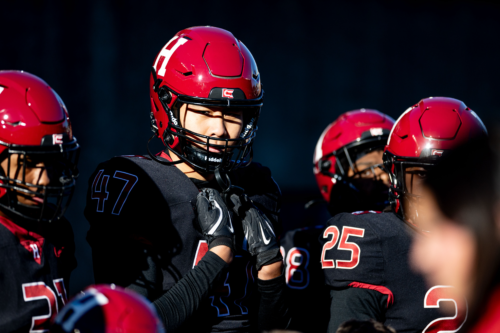Collegiate sports are a true testament to athletic ability and lifelong dedication to a singular sport. Summer training camps, recruiting events, and highlight reels are an arduous reality for many American teenagers set on actualizing their dreams of receiving a D1 offer. However, raised in Beijing, immersed in a completely different environment than that of field goals and touchdowns, Leo Li ’27 experienced a unique journey to becoming one of Harvard football’s tight ends.
Growing up playing basketball, frisbee, and the occasional game of flag football, Li had a natural proclivity for sports. Once arriving at Harvard, he knew he wanted to continue his engagement with athletics and joined the club basketball team. However, while Li found this a “great experience,” he became increasingly attracted to varsity athletics after growing close with his first-year neighbor and now-teammate Jack Crowley ’27.
From the on-campus season excitement to the national appreciation for Sunday Night Football, Li realized that, instead of furthering his club career in basketball, he wanted to try to walk on to the Harvard football team. Reflecting, he stated, “Playing a collegiate sport at a very high level is something that I always really wanted. And football is one of the sports that, not only do I love, it’s also something that I aspire to do.”
In addition to his passion for football, Li’s choice to transition out of basketball was also based on pragmatism. “The basketball team is extremely small. So all their recruits are… super central to the team,” he commented. “They have a very small roster. Whereas in football, they have a very large roster… I could probably walk on as a backup player.”
Li reached out to the head coach through Crowley to learn more about how to initiate the walk-on process. While the coach was incredibly receptive, time constraints and busy schedules pushed Li’s evaluation to the weeks following his first-year summer. “I had to work really hard over the summer,” he said.
While acquainting himself with such a technical sport in just a few months was a daunting task, Li got a trainer, started lifting multiple times a week, and engrossed himself in the fundamentals of the game. By August, Head Coach Andrew Aurich recognized the tremendous growth he made in such a short period of time and welcomed him to the team with a “clean slate” and voiced that both he and the team “expect[ed] [Li] to commit to football.”
Since joining Harvard’s football team, Li’s lifestyle has drastically changed. “Football is such a huge and insane time commitment,” he noted.
Weekly practice starts on Tuesdays during the season, where Li has to be at the athletic center by 6 a.m. for lift. Later in the afternoon, he returns for a playbook strategy meeting and then practice to follow. Wednesdays and Thursdays follow a similar schedule, just without lift. Structured around their games, Friday and Saturday are typically entire days of practice and playing time. After Sunday lift, the football team finally has a break on Monday. While the off-season is not nearly as strenuous, according to Li, there are still lift programs football athletes must adhere to four times a week and break training camps that ensure every player is staying in shape.
In comparison to his flexible schedule and free time during freshman year, Li must now plan everything in advance. When thinking about how he manages everything from deadlines to his social calendar, Li stated, “You have to be really rigorous and have a really good system in place.” Regardless, the rigorous practice schedule has been conducive to Li’s growth as a player and person.
Even off the field, the time commitment remains persistent. Li mentioned that, “Football is a very physically demanding sport. I personally think the logistics and strategy of football is harder than any class I’ve ever taken.” Between memorizing plays to understanding the more technical aspects of the game, there is a tremendous amount of work that continues beyond the turf. Li often jokes with his friends that, “Football is harder than multivariable calculus.”
Nonetheless, to Li, there is power in the group effort behind every mandatory practice, morning lift, training camp, and team dinner. Li believes that “hanging out with these people will make me better too” when thinking about the discipline football has taught him.
Community has remained a huge value of Li’s, even in the face of these drastic social and scheduling changes. Within football, Li has found a micro-community among his fellow tight-ends. And apart from the field, Li still prioritizes making time for his other friends. “I don’t want to use football as an excuse,” he said.
Though only part of the team for a few months, Li explained that “the most rewarding part is just to see yourself make progress.” Something as seemingly subtle as being able to call out the plays when the quarterback signals them resonates with Li as someone who just a year ago knew little about what playing for a collegiate football team meant.
Looking ahead, Li hopes to continue to improve his skill set. “Football is definitely a challenge,” he confessed. However, he is excited to improve his mental tenacity, continue to lift more and more, and eventually climb up the tight-end roster.
Sara Kumar ’27 (sjkumar@college.harvard.edu) recently learned that a touchdown is only worth six, not seven, points.

